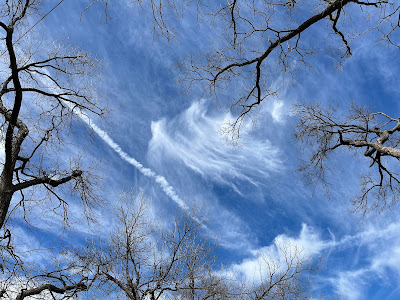Yesterday morning I spent rather a long time doing something I had wanted to get at for years: transplanting a clump of wild gladiolus--the scions of a single plant I found under the nandina shrubs on the north side of the property in the first spring after we moved into the house.
I don't think I actually planted them in this spot, but thanks to our furry denizens (some of whom later nearly destroyed the entire patch after developing a taste for the bulbs) some ended up next to the sidewalk that extends from our back door to form a large square area within which a brick patio and our greenhouse have been erected. After said near-extinction, I thought I'd lost them again after the deep freeze in February of 2021, but they're incredibly hardy and keep coming back no matter what happens.
 |
| The wild gladioli in May of 2021(lower right)--after Snowmageddon |
Unfortunately, their growth had been so exuberant that they had obscured a large part of the sidewalk. I had thought for several years that they needed to be dug up and transplanted, and some lower-growing replacement needed to be found.
On a whim, I got out my garden/archaeology tools (my old Marshalltown mason's trowel and a soil screener), as well as my spading fork, a couple of nippers, a large rusty iron nail, a little Japanese twig saw, and a foam pad for kneeling), and went to work. This was probably not a great idea, given my current age-related joint problems, but the weather is warming up and I wanted to take advantage of the temperatures (in the high 60s yesterday, and 80s today). Indeed, I was rather sore by the time I had enough of the job done to quit for the day, but enjoyed the work--even though it turned out to be more arduous than I had expected. And I broke my spading fork. After that, I had to use a regular spade--pictured below, along with some of the other tools and my assistant, Molly.
It turns out that the bulbs had multiplied and bunched up right next to the concrete sidewalk, some even burrowing a bit under the three-inch slabs. I ended up using the trowel not so much as a digging tool, but as an excavator--taking me back to my days in the Long Island Pine Barrens, working on a site where some "Pineys" (itinerant travelers) had camped. A paint brush would have helped, but I was down on all fours and I was saving the effort of getting up until I was finished. In the end, some three hours after I'd started, I had unearthed the clump's components, laid them in the soil screen, piled leaves on top of them, and dowsed them with water to keep them from drying out overnight.This morning I performed bulb-triage, and divided the crop into bulbs-only, bulbs-with-short-leaves, large-bulbs-with-long-leaves, and little-tiny-bulbs-with-iffy-stems-and-leaves, and bits to be composted. I found places to plant all but the LBWLL group, and they'll have to be protected again tonight. They'll go into the front border and a little swath of border next to the porte-cochere, where a few canna lilies and volunteer wild onions have found a home. But that's for tomorrow.The weather, after some very cold spurts, quite a bit of rain, an ice storm (which affected us very little), is now tempering out. The skies have been lovely, with evidence of the winds that we have grown to expect as we head to spring (now only a month away).
These days, when not scruffing about in the clay, I spend time musing on mortality, as one does when confronted with the brevity of existence. We've lost two close friends within the last couple of months, and I came into the house yesterday to the news of President Carter's entering into hospice, and President Biden's trip to Kiev on the first anniversary of that needless, wasteful war in Ukraine. The recent earthquake in Turkey brings back memories of much less violent events in my childhood, but stories that have emerged from that catastrophe are both horrifying and heartening.
I'm especially moved by Jimmy Carter's choice to forego further hospitalization and to end his long and inspiring life at home. This was a choice my own father made, when his thyroid cancer could no longer be treated effectively. I have been grateful ever since that my children and I got to see him in his own den, next to his ham radio setup, surrounded by books he loved and the family that cherished him. I wish everyone could come to the end of their lives in peace and relative comfort. For those who face war and disaster, there's little any of us can do but to support efforts to relieve some of the anguish. It feels incredibly inadequate, but it is something. And so is remembering them, and finding ways to end political violence and to mitigate natural disasters by building better and safer places to live.
As we move from one season to another, my natural pessimism fades a bit. Things really could be worse, and attending to the accidental garden provides some equilibrium, at least for a time. But now I think I'll go and enjoy the company of The Beloved Spouse and our "daemons" (in Philip Pullman's usage). The rest of the transplanting can wait until tomorrow.
End note: The Marshalltown trowel link included above is to a post on Owl's Cabinet of Wonders, from my MOOC period of existence, nearly a decade ago. I truly enjoyed the online courses offered through Coursera and other venues, and am glad I had the foresight to include some of the materials in the blogs.



